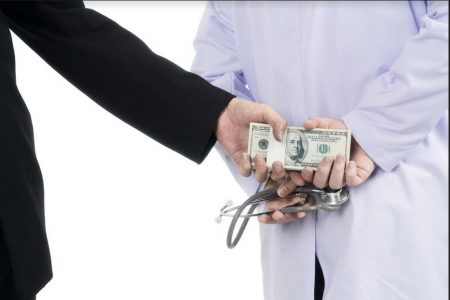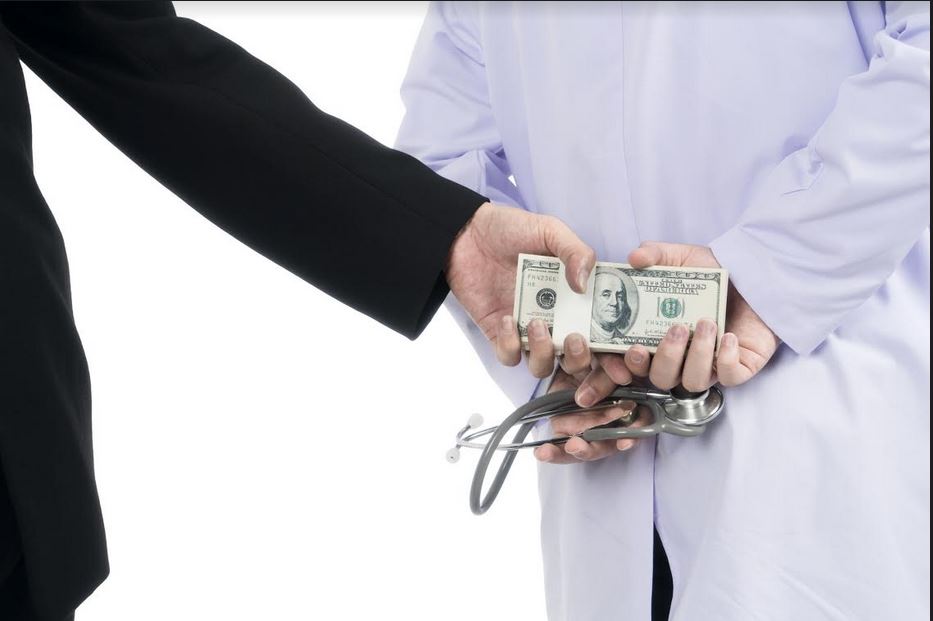PROTECTING YOUR MEDICAL INFORMATION
by Contributor
 (Jun. 24, 2019) — Healthcare fraud is practiced by a few dishonest care providers who do not have your best interests at heart. Learn how to recognize it for your protection.
(Jun. 24, 2019) — Healthcare fraud is practiced by a few dishonest care providers who do not have your best interests at heart. Learn how to recognize it for your protection.
Estimates from the National Health Care Anti-Fraud Association (NHCAA) show that about $68 billion is lost to healthcare fraud cases annually. These estimates could go as high as $260 billion as well.
So, why are these figures so high? And, what is healthcare fraud all about?
Healthcare fraud involves the falsification of crucial information pertaining to a patient’s medical records. Usually, this happens when a healthcare provider needs to make a claim to be reimbursed for some medical services provided to the patient.
Healthcare fraud can occur in a number of ways such as having unnecessary tests and procedures on a patient.
With the rising cases of medical fraud, it’s important to know what to be on the lookout for. Regardless of the kind of healthcare insurance you have, healthcare fraud results in higher premiums and reduced coverage.
Eventually, the higher expenses that result from medical insurance fraud could mean that health insurance could remain a pipe dream for many Americans.
Well, in this post, we will highlight some of the things to look out for in regards to healthcare fraud. Keep reading to learn more.
Common Types of Healthcare Fraud
NHCAA lists the following as the most common types of healthcare fraud and abuse:
- Performing unnecessary medical procedures just to benefit from insurance benefits.
- Using genuine patient details to bill for services that were not actually provided. Usually, the patient details may have been obtained illegally through identity theft.
- Falsely billing for services that are more expensive than what was provided. This is commonly referred to as upcoding.
- Billing each step of a procedure as if it were a procedure on its own.
- Billing for services that are not covered by the insurance companies by renaming them as billable medical procedures.
- Having a patient pay for more than the co-pay amount even in cases where the plan has all the fees paid in full.
- Overbilling the insurance provider and waiving the patient co-pays or deductibles.
- Accepting referral fees from other medical providers.
- Billing for unlicensed and unapproved drugs
- Forging a physician’s signature if one is needed for reimbursement of medical fees.
Penalties of Fraud and Abuse in Healthcare
The Health Insurance Portability and Accountability Act (HIPAA) has put in place laws that account for the consequences of health insurance fraud.
Medical fraud is a federal offense, and HIPAA states that there are significant penalties if found guilty.
A sentence of up to 10 years in a federal prison is the standard penalty. However, this may be coupled together with some monetary fines.
In the event that the medical insurance fraud resulted in injury to a patient, the sentence could be doubled to up to 20 years. Should a patient die, the offender may face a sentence of life imprisonment.
Risks of Healthcare Fraud
Besides being a federal offense, healthcare fraud poses some risks, particularly to the affected patients.
False Diagnoses and Treatment
As is the case with all types of fraud, healthcare fraud requires that important information is falsified. In this case, information on the patient’s health and history is at stake.
Often, cases of health insurance fraud involve dishonest healthcare providers misdiagnosing patients and entering this information into their records. Usually, patients are diagnosed with conditions that they don’t have or more severe ones.
The healthcare providers then submit insurance claims for payment.
Physical Risks to the Patients
An extreme consequence of healthcare fraud and abuse is that it may lead to physical injuries for the patients.
In some cases, patients may be subjected to unnecessary medical procedures and services so that healthcare providers may benefit from insurance benefits.
These unnecessary procedures may result in physical injury for the patients as well as lead to some serious medical conditions.
Theft of Finite Insurance Benefits
Patients who have private health insurance have limits on the benefits of their insurance policies.
Whenever a false claim is made on their policies, the patient’s lifetime benefits reduce. Eventually, the patient will not have their insurance benefits when they need them the most.
Medical Identity Theft
This occurs whenever a patient’s identity is used to make false claims without their knowledge or consent. False information may be added to a patient’s records, and in some cases, an entirely different history is made under the victim’s name.
Medical identity theft comes with several disadvantages for the patient. They may find that they are ineligible for both life and health insurance coverage, find their benefits exhausted, and even receive wrongful treatment.
Medical identity theft may cause a victim to miss out on a number of opportunities. For example, the victim may miss out on an employment opportunity for failing the physical exam. They may have a disease documented in their history for which they have never been treated and had no idea about it.
What Can You Do?
Healthcare fraud is increasing at an alarming rate, and it’s important that all patients are vigilant to avoid more cases.
Always ensure that your health insurance card is safe, just as you would your credit card. Don’t disclose sensitive information such as policy numbers to salesmen or over the internet.
Constantly reviewing your medical records is the best way to ensure that nothing passes you by. Have a look at the insurance estimates of benefits to ascertain that there are no errors.
Should you find an error, especially regarding the amount that was paid to your healthcare provider, report to your insurer immediately.
If the problem involves Medicare, there is a certain procedure that you can follow to make a report.
Medicaid also allows you to make a report by following this procedure.
Wrapping Up
Healthcare fraud is alarmingly on the increase and results in huge losses for both the patients and the insurance companies. As such, vigilance on the patients’ part plays a key role in combating medical fraud.
Get informed and learn more about healthcare fraud. Who knows? You might help counter the severe consequences. Besides, in some cases, you may be awarded a small percentage of the recovered funds. Sounds like a good deal, right?
Visit the rest of our site for more insightful content and don’t forget to bookmark our site to never miss any of our latest posts!

